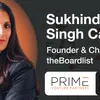The secret sauce to building a category-defining startup: Vidit Aatrey of Meesho shares his recipe
In this episode of Prime Venture Podcast, Vidit Aatrey, CEO and Founder of Meesho, reveals his journey as an entrepreneur, what led Meesho to become a category-defining startup, managing trust and accessibility in online shopping, and more.
Meesho, which began operations in 2015, has never looked the same as a business in each year of its journey to date. Yet, it is now considered as a category-defining startup, valued at $2.1 billion, and placed in the same league as Airbnb.
So, how do you define a category as a startup?
Vidit Aatrey, Founder and CEO of , offers an answer: “By staying close to your users.”
The founder acknowledges that during the first year he and his co-founder did not know what their product would look like. However, they were sure that their target customers would reveal the idea. Meesho has become what it is today by “constantly engaging with users over the years”.
“All our brilliant ideas have come from our customers,” Vidit says. “Once we figured out that we wanted to help small businesses digitise themselves, we would go and sit in their shops every day just to observe their daily operations. When we modified our platform to enable women entrepreneurs, I would run a WhatsApp group with 10-15 initial users of Meesho and constantly stay in touch.”
Vidit says one must accumulate the necessary insights on building a product directly from the end user or else it becomes difficult to be intuitive and judge the product’s value.
One of Meesho’s primary core values is to constantly communicate with customers; that is how the social ecommerce company is still growing exponentially.

Sanjeev Barnwal (L) and Vidit Aatrey, Co-founders, Meesho
Aligning investors and employees
When you are building a category-defining startup, no one will see the actual business model or the target problem. The company will look different every year. Vidit effectively kept his investors and staff aligned to the company’s idea by using two unique yet simple strategies.
“First, everyone in the company needs to understand the core problem that you are trying to solve,” he says.
For Meesho, it was digitising small, local businesses and he made sure that every board member, investor, and employee understood this goal even when the “how” changed quite frequently.
“Second, you need to maintain a clear path of communication. Even the junior-most employee in your company should be well versed with the company’s visions and ideas that you generally discuss in the boardrooms.”
How to build a team for a category-defining startup?
Ultimately, the team will get you where you want to reach, and a few hiring opportunities just fell into place for Vidit and Meesho. He explained how, early on, he hired ex-entrepreneurs who understood the startup’s cultures of non-linearity and uncertainty.
From there on, Vidit would give his new recruits the contact numbers of 10-20 Meesho users to enable them to get an idea about how people were using the app.
“People care about the type of company they are working for. If they can see their contribution to the company is actually helping people and feel they are a part of something big, the team will automatically stay with you,” he says.
Vidit’s strategy to help people was to keep his staff close to the users – a constant theme in Meesho’s success.
Start as soon as you can
“Category-defining startup or not, start your company as soon as you can. There is no perfect time to leave your job and step into the startup ecosystem,” says Vidit, talking about the thing he would change about himself if he could do everything again.
The Meesho founder adds: “If you feel that you are an undercooked entrepreneur, you will make mistakes. But those mistakes will impart valuable lessons that you can use in your journey ahead”.
To know more, listen to the podcast here
Time stamps:
01:05 - Early days of Meesho, the idea, and the challenges
13:30 - Meesho’s core value of always listening to users
16:50 - Team building, hiring, and retaining talent at startups
26:50 - Current landscape of the Indian ecommerce sector
33:00 - Importance of trust and accessibility in ecommerce
36:35 - Vidit’s journey as a founder and his learnings
Edited by Teja Lele








